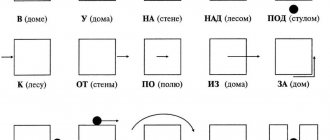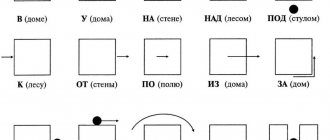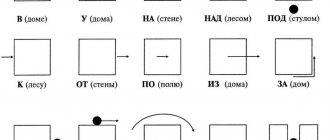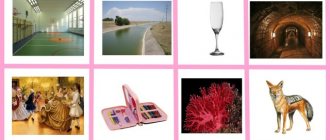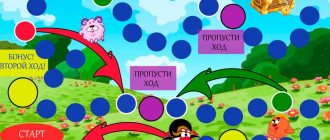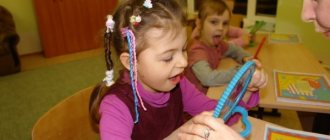We begin automating sounds in words only after the child clearly pronounces an isolated sound and can pronounce it correctly in syllables. We name words, highlighting the automated sound with our voice. We pronounce the words slowly, pronouncing them clearly. It is advisable to repeat the same word 2-3 times.
Articulatory posture: lips are open, it is better to stretch them into a “smile”, so that the teeth are exposed, the teeth are open, the tongue is free, spread out like a “scapula”, the tip is raised to the alveoli or necks of the upper incisors and forms a tight connection with them, the lateral edges of the tongue are lowered and form gaps with the molars through which air passes, the root of the tongue is raised.
Pronounce clearly the sound [l] in syllables, first vertically, then horizontally: la al ala lal lo ol olo lol lu ul ulu lul ly yl yly lyl
We fix the pronunciation of the sound L at the end of words:
oval glass channel collapse pencil case basement station metal capital dump truck angle prick table trunk falcon goat cauldron church football buffalo knot woodpecker Pavel ashes torch newcomer donkey chair basketball
Exercise “Listen. Remember. Repeat"
Ball - small - hall. Collapse - metal - glass. Digged - nodded - yawned. Vol - goal - count. Cauldron - goat - goldfinch. Donkey - cover - football. Torch - woodpecker - ash. He made noise - hissed - walked.
The sound L at the end of a word in a series of words
List of words: Hall, canal, glass, basement, Ball, pencil case, coral, jackal.
List of words: Table, cauldron, goat, goldfinch, Ox, donkey, football, cover.
We fix the pronunciation of the sound L at the beginning of words:
varnish shop lama lamp noodles bast weasel patch palm avalanche swallow lamp forehead crowbar dexterous boat elbow elk vine catch break chunk tray meadow moon puddle meadow Luka lawn bow splint magnifying glass bast crafty
Exercise “Listen. Remember. Repeat"
Bench - paw - lamp. Delicacy - boatman - shopkeeper. Elbow - spoon - boat. Bow - magnifying glass - puddle. Lusha - hole - ray.
Russian words ending in L
Reverse Russian dictionary (word endings in L) - Igor Garshin’s website
| Garshin.Ru |
| Lexicons |
[/td]
WriteHome > Zaliznyak's Reverse Dictionary > Words ending in L
Common Slavic roots of Russian: | | | | | E, E, Ѣ | | | | | | | | | | | | | U, Ѫ | | | | | | Yu, i | I, and
Original Russian words: | | | | | E, Yo | | | b, s, b | | |
Foreign borrowings in Russian: | | | | | | | | |
Alphabetical sections of Trubachev's ESSAY : | | | | | | | | | | | | | | | | | | | | | | | | | | | | |
| Russian dictionaries: | Bibliographies: | Etymological | Intelligent | Dialectal | Historical | Regulatory | Terms |
| Dictionaries on the site: | Fasm. | Tsyg. | Shan. | Sem. | Shap. | Shim. | Dahl | Krysin (in.sl.) Ozhegov | Arch. | Novg. | Psk. | SRNG | Academy | Lopatin | Tikhonov | Oil&Gas | Prombez | | GIS |
Words ending with: | | | | | | | | | | | | | | | | | | | | | | | | | | | | | |
- ball
- cannibal
- clavicimbal
- shaft
- blockage
- bulk
- carnival
- collapse
- basement
- semi-basement
- pass
- drilled
- camber
- took root
- halt
- sei whale
- squall
- cymbal
- fin whale
- oval
- snowed
- shabby
- hayloft
- clayed
- fuller
- farrier
- collapse
- on the spot
- shapoval
- felling
- failure
- windfall
- squared
- semi-oval
- narwhal
- serval
- interval
- helm
- stall
- dump truck
- dump
- val
- half shaft
- felt
- bragging
- cover
- self-praise
- fallout
- kagal
- astragalus
- madrigal
- grill
- martingale
- argal
- Kamchadal
- vandal
- scandal
- sandalwood
- shandal
- feudal lord
- ideal
- real
- cash-real
- range
- dagger
- hall
- audience hall
- conference hall
- railway station
- air terminal
- bus station
- antechamber
- cinema hall
- kurhaus
- gym
- dance hall
- branch
- ceremonial
- rial
- imperial
- semi-imperial
- material
- building material
- lumber
- electrical material
- timber
- photographic material
- memorial
- equatorial
- factorial
- curial
- vial
- initial
- official
- differential
- potential
- biopotential
- provincial
- feces
- temper
- intensity
- caracal
- elder
- jackal
- overheated
- radical
- cleric
- vertical
- wineglass
- under-calculated
- rocks
- fiscal
- grin
- scoffer
- lal
- starch
- channel
- signal
- block signal
- echo
- stop signal
- video signal
- radio signal
- light signal
- pencil case
- arsenal
- original
- cardinal
- crime
- denomination
- luminal
- the final
- semi-final
- quarterfinals
- professional
- national
- International
- ammonal
- veronal
- staff
- medical staff
- technical staff
- sulfonal
- magazine
- newsreel
- tribunal
- revolutionary tribunal
- fell
- fuse
- tanned
- municipal
- principal
- opal
- dug
- gummicopal
- homemade
- fell out
- maral
- emergency
- integral
- chinodral
- liberal
- general
- mineral
- admiral
- vice admiral
- admiral general
- rear admiral
- goral
- chloral
- chorale
- corporal
- trawl
- theatergoer
- central
- bromural
- khural
- station wagon
- vassal
- tall
- capital
- Santal
- tantalum
- quintal
- blackened
- red-faced
- drip
- quarter
- portal
- pedestal
- ritual
- intellectual
- halyard
- platyphalic
- brachycephalus
- mesocephalus
- macrocephalus
- microcephaly
- dolichocephalus
- platycephalic
- brachycephalic
- stegocephalus
- mesocephalic
- macrocephal
- microcephalus
- dolichocephalic
- rhynchocephalus
- Bucephalus
- pennant
- impudent
- started
- picked up
- berth
- thought
- set sail
- marshal
- field marshal
- marshal
- white
- shipbuilder
- underbelly
- decibel
- space
- chaff
- Kartvel
- angel
- archangel
- groundwork
- allotment
- manager
- redistribution
- limit
- chapter
- subsection
- word section
- syllable division
- watershed
- aisle
- under-delivery
- bungler
- glassmaker
- buttermaker
- winemaker
- clothmaker
- carpet weaver
- done
- cheese maker
- Department
- health department
- subdepartment
- housing department
- women's department
- financial department
- political department
- technical department
- special department
- lot
- allocation
- goat
- node
- bathroom
- radio center
- waterworks
- torch
- chalk
- ash
- quail
- tripoli
- pennant
- braid pennant
- bogeyman
- Karelian
- Mingrelian
- shot
- shelling
- shelling
- shot
- crossbow
- urchin
- lumbago
- execution
- shooting
- shot
- oxide
- idea
- speculation
- thought
- fishing
- salt production
- oil field
- intent
- fiction
- loops
- celandine
- spit
- woodpecker
- aim
- male
- goat
- half-goat
- eagle
- donkey
- new settler
- calving
- new calf
- first calf
- boiler
- church
- rod
- silt
- ail
- kabil
- moron
- strobil
- crocodile
- aedile
- prolific
- tubeweaver
- sandstone
- old-timer
- alguasil
- dogwood
- keel
- Tamil
- Bogomil
- phenyl
- vinyl
- divinyl
- vinyl chloride
- polyvinyl chloride
- perchlorovinyl
- Zoyl
- notch
- undercut
- cut through
- slept
- sawing
- hamadryad
- mandrill
- tetryl
- nitrile
- carboxyl
- indoxyl
- elecampane
- methyl
- acetyl
- chrysotile
- TNT
- covered
- flooring
- bedding
- self-styled
- spread out
- butyl
- rutile
- ethyl
- Judophile
- bibliophile
- Francophile
- Turkophile
- Anglophile
- psammophile
- thermophile
- Germanophile
- Hellenophile
- Polonophile
- Slavophile
- hygrophilic
- Russophile
- cycle
- epicycle
- biocycle
- motorbike
- point
- Gaul
- coral
- metal
- non-metal
- bimetal
- crystal
- pseudocrystal
- single crystal
- phallus
- Maxwell
- armadillo
- beryl
- chrysoberyl
- mesophyll
- chlorophyll
- sporophyll
- xanthophyll
- roll
- rock'n'roll
- atoll
- hall
- music hall
- penching ball
- handball
- amphibole
- volleyball
- obol
- discus thrower
- motorball
- baseball
- basketball
- football
- pushball
- ox
- arbitrariness
- buffalo
- symbol
- trunk
- devil
- Goal
- verb
- goldfinch
- Mongol
- Buryat-Mongol
- collargol
- protargol
- corner
- dol
- idol
- validol
- solid oil
- amidol
- asidol
- indole
- hem
- continued
- stodol
- quiet
- dry land
- carnelian
- Creole
- halo
- dibazole
- phthalazole
- pyrazole
- sulfazole
- norsulfazole
- podzol
- resol
- perezol
- cresol
- Lysol
- anisole
- camisole
- benzene
- azobenzene
- pyrobenzene
- nitrobenzene
- coxobenzene
- chlorobenzene
- creosol
- otzol
- vizol
- ichthyol
- count
- stabbing
- prick
- funny
- wood splitter
- icebreaker
- thiokol
- bell
- The Tsar Bell
- puncture
- hole puncher
- falcon
- protocol
- stockade
- chipped
- split
- spall
- injection
- guaiacol
- salol
- xylene
- pyrogallol
- they say
- ground
- threshing
- grind
- grinding
- thymol
- mantis
- mantis crab
- unfinished
- flour mill
- grinding
- Komsomol
- osmol
- begged
- rivanol
- methanol
- eugenol
- phenol
- indophenol
- nitrophenol
- carbinol
- pavinol
- floor
- underground
- ramrod
- dome
- roll
- nigrol
- nerol
- calciferol
- styrene
- polystyrene
- airol
- birth
- pyrrole
- sinestrol
- furfural
- safrole
- salting
- Prasol
- salt
- oversalting
- hospitable
- add salt
- insufficient salting
- callus
- pickle
- ambassador
- salting
- hypersol
- brine
- usol
- tol
- skatole
- autol
- metol
- anethole
- menthol
- boromenthol
- table
- throne
- apostle
- naphthol
- benzonaphthol
- axerophthol
- toluene
- nitrotoluene
- trinitrotoluene
- foul
- case
- topknot
- pearl
- schorl
- earl
- jarl
- thought
- fishing
- meaning
- aul
- trunk
- guard
- esaul
- podesaul
- saxaul
- ertaul
- Kabul
- somnambulist
- Beelzebub
- hum
- Agul
- spree
- feeding
- revelry
- pamper
- Vogul
- absenteeism
- time off
- walking
- blew
- oracle
- follicle
- matrix
- vendor code
- diverticulum
- carbuncle
- homunculus
- furuncle
- tubercle
- muscle
- minuscule
- majuscule
- mule
- stimulus
- manul
- pool
- scruple
- consul
- vice consul
- proconsul
- promise
- chapter
- title
- running title
- title
- tarantula
- chair
- blasphemed
- Hutsul
- Chernobyl
- fervor
- dust
- hoof
- rotorcraft
- woolwing
- kiwi
- beaked whale
- starfish
- tubespout
- send
- send
- message
- rear
- yal
home
Slavic roots | Slavic words | Borrowings | Root morphemes | Consoles | Suffixes | Endings | Postfix groups | Function words | Onomatopoeia | Interjections | Bundles of meaning | Word structure and formation | Speech sounds | Spelling | About Russian language
Russian dictionaries: Bibliography of all types | Archive of site dictionaries Other dictionaries: Pronostratic | Proto-Indo-European | Proto-Slavic | Old Church Slavonic | Foreign | Terminological
© “slovorod.ru”, 2012. Igor Konstantinovich Garshin. Subsidiary web project of Igor Garshin's Site. The author and owner of the sites is Igor Konstantinovich Garshin (see author’s resume). Write letters ( ).
Page updated 07/17/2019
The sound L at the beginning of a word in a series of words
List of words: Paws, boat, light bulb, elbow, bast shoe, swallow.
List of words: lily of the valley, bench, lamp, spoon, elk, shovel, varnish, palm.
List of words: bow, rays, moon, lawn, horse, lotus, forehead, husky.
We fix the pronunciation of the sound L in the middle of words:
saw bowl spinning top rock shark fist salad robe talent malachite beam squirrel roll jackdaw stick fork shelf needle violet hairpin pin bottle column tent shovel whisk salt shaker lapdog jump rope piggy bank parcel stretcher catch weed weed chop grind hair head gold milk hunger voice cold ear balloon swamp straw column cold rinse half hammer boulder cleaver naughty sheepskin coat dove dove dove beluga Kaluga acorns deck pitchfork saws vacation scarlet cute white cradle wormwood smile Exercise “Listen. Remember. Repeat"
Cases - ash - saw. Robe - salad - rock. Ear - voice - hair. Pin tents are sleds. Swamp - Volodya - breakdown. Hungry - cold - well. Smile - cobblestone - bagpipes.
Features of sound automation [L]
After the sound is delivered, it should be introduced into free speech. It will take a long time for the child to be able to freely pronounce the sound in his own speech. Repeatedly performing the same articulation will allow the sound to be spoken unconsciously. This process is called automation.
A phoneme cannot be fixed until the child learns to reproduce it accurately in isolation. Before conducting classes to consolidate sound, it is necessary to prepare the muscles of the speech organs by performing special speech therapy exercises. The sounds mixed by the child when talking are automated one by one in different classes.
When a phoneme is omitted, the automation stage occurs quite quickly, since there are no formed conditioned reflex connections in the speech centers of the cerebral cortex; their creation is required. In case of defective pronunciation or when mixing phonemes, these connections already exist; they need to be destroyed, while simultaneously creating a new motor stereotype of correct articulation. In this case, consolidation lasts a long time.
The sound automation process includes certain stages; violation of this stage-by-stage process is not allowed. In uncomplicated cases (with physiological age-related dyslalia), all stages can last only about five minutes.
The sound [L] is automated in the following order:
- Automation of an isolated phoneme.
- Practicing on the material of syllables.
- Consolidation in words.
- Fixing phrases on the material.
- Consolidation in poems.
- Practicing coherent speech.
- Introduction to independent speech.
[l] and [l']: we speak correctly
- They smiled broadly, teeth clenched.
- They opened their mouth slightly.
- The edge of the tongue rested against the gap between the teeth, or pressed it against the alveoli, or pressed it on the upper teeth. The sides of the tongue should not touch the teeth.
- The air comes out through the holes formed at the edges of the tongue with force and pressure.
It’s easier to give a child [l] from the following position: smile, teeth in a fence. Lightly biting the tip of the tongue, we begin to hum like an airplane: “L-l-l.” The baby should hear what sound he makes. Gradually move your tongue to the desired position - behind the upper teeth.
Articulation gymnastics at home
To teach a child to pronounce the sound “L”, exercises that develop the articulatory apparatus and speech breathing are required at each lesson.
Before showing your offspring the exercises, make sure they are performed clearly in front of the mirror yourself. The atmosphere during classes should be relaxed. Remember, all your training should look like an entertaining game so that the child is interested.
First, let's learn how to relax our lips.
- "Smile". We smile, exposing our upper and lower teeth, and count to ten.
- "Tube". We stretch out our lips with a tube, as for the sound “u”. Using elongated sponges, make a square.
- "Needle." In the “Smile” position, we push the tip of the tongue between the teeth. We alternate the “Tube” and “Needle” exercises.
- "Fish" Let's clap our relaxed lips like a fish in an aquarium.
- "Let's stop the horse . Inhale deeply through the nose, exhale through the mouth. The lips are relaxed and vibrate. It turns out “Prr-r-r.”
Now let's stretch the tongue.
- "Polite Monkey" Smiling, we open our mouth like a monkey and show our teeth. We try to keep our tongue on our lower lip for a few seconds.
- "Pancake." Our tongue turns into a wide and flat pancake, we place it on the lower lip, not forgetting to smile. We blow slowly, “cooling the pancake”; the air stream should pass through the middle of the tongue.
- "Nut". We press our tongue into different cheeks from the inside, one at a time, as if we were rolling a nut or caramel in our mouth.
- "Hammock". The tongue should rest against the upper front incisors and bend like a hammock. Hold the tongue while counting to 10.
- "Swing" . We swing our tongue on a swing - up and down. The lips are parted in a smile, the tongue does not stick out.
Let's move on to exercises for pronunciation of [l'] and [l].
- "Steamboat". Opening your smiling lips, stick the tip of your tongue out and press it with your teeth. We hum, imitating the steamboat: “Y-y-y.” If the baby says “l”, let him stick out his tongue more and bite it in the middle.
- "Turkey". Try to imitate the “turkey speech” with your little one: “Blah, blah.” Open your mouth slightly, bend your tongue over your upper lip and move its tip up and down. Then, as you exhale, we begin to hum, gradually accelerating the movements of the tongue.
- "Horse". Speech therapists usually break the exercise into two parts. First, we learn to click our tongue loudly (“The horse is galloping”). The muscles of the tongue are strengthened, and the position of the raised tongue is learned. Hold the lower jaw with your palms if the baby cannot hold it still. The second part is “Horse on Reconnaissance.” The pace is leisurely, without voice. The tip of the tongue rests on the upper palate.
- "Breeze". They opened their mouth slightly, biting the edge of their tongue with their teeth. We exhale - “breeze”. Air streams should come out from the sides of the tongue. You can see if your baby is blowing correctly by holding a feather to his mouth.
When exercising, do not overdo it, otherwise you will cause a negative reaction. Remember that to make sounds you need to exhale correctly. Therefore, exercises are necessary to control the flow of exhaled air. Blow soap bubbles, boats on the water, blow on them, blow off feathers, blow out candles. Start by setting the soft [l'] - it’s easier for the child, and it’s easier to move from it to the hard [l’].
General recommendations for audio automation [L]
The correct pronunciation of any speech unit is demonstrated by an adult, and only then repeated by the child. Ideally, he should not make a single mistake when fixing a phoneme, so that an incorrect template does not interfere with the formation of the correct one. Therefore, the teacher must control the pronunciation in order to prevent mistakes and provide hints.
It is extremely important to practice a new phoneme not only in remedial classes, but also in everyday activities. If the sound being studied is pronounced correctly only in class, then “office speech syndrome” appears, when in the presence of a teacher all speech material is pronounced accurately, and the acquired skills are not applied in everyday life.
It is necessary to control the content of the proposed material - there should be no oppositional phonemes. “Conflicting” phonemes can be absolutely any pairs. For each case, it is necessary to select an individual material file. If you encounter such a word or combination, you cannot demand that all sounds be pronounced correctly. Mixed phonemes are distinguished at a special stage of differentiation.
At first, a very exaggerated articulation of the given phoneme is necessary. This is required in order for the auditory analyzer to record the new sound as exemplary.
At first, you need to reinforce the new sound by any means; you cannot give the baby the right to speak it without support and control. Doing homework on your own creates a serious problem. If a child can read, you should not allow him to read the words on his own; an adult must give the correct example, after which the child must reproduce it. It is also important for adults to monitor and correct incorrect pronunciation in everyday life.
